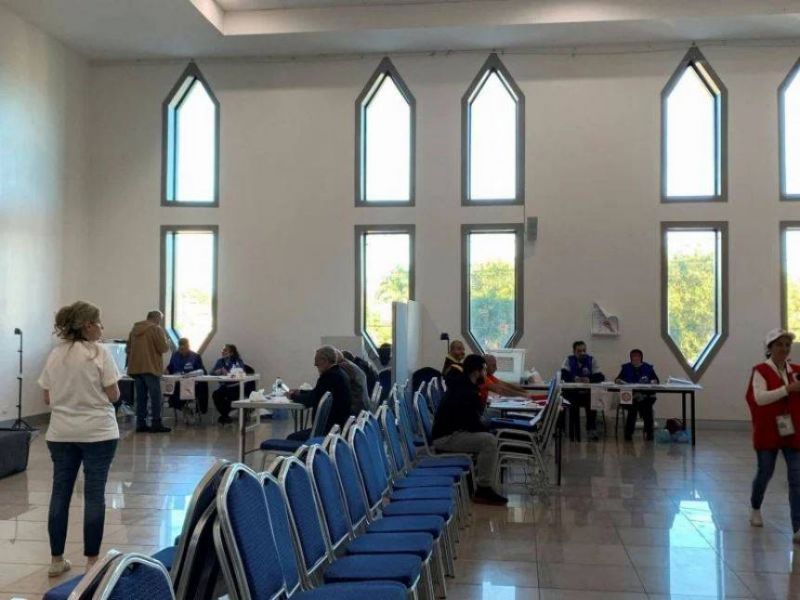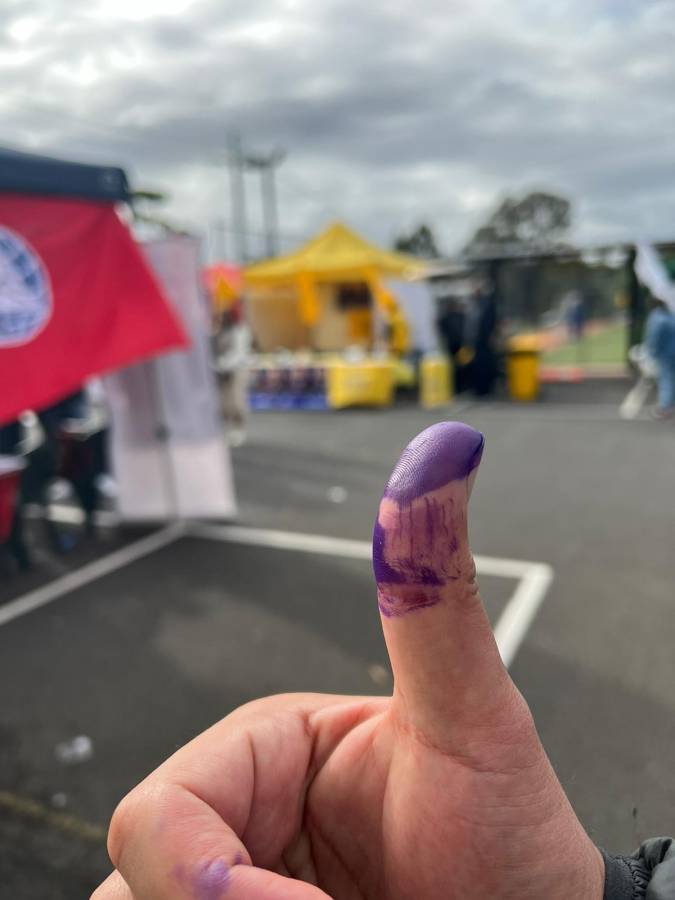
Lebanese at a polling station in Sydney, Australia, on May 8, 2022 as part of the Lebanese legislative elections. (Credit: Stefica Nicol Bikes/Reuters)
In Europe, Canada, the United States, Australia, Africa, Latin America and Asia, 194,348 Lebanese voters are eligible to vote on Sunday in 48 countries, as part of the second day of legislative elections held abroad. In the first set of diaspora held polls on Friday in Iran and a number of Arab countries, nearly 59 percent of voters went to the polls to take part in a crucial ballot for a Lebanon in crisis.
At 3:30 p.m., according to figures from the Lebanese Ministry of Foreign Affairs, the turnout reached 54.83 percent in Australia and 44.61 percent in the United Arab Emirates. According to Foreign Minister Abdallah Bou Habib, 11,328 voters voted in Australia (55 percent of voters in Sydney, 40 percent in Canberra and 55 percent in Melbourne).
In the UAE, where long queues in overwhelming heat were reported in Dubai, 11,182 voters took part in the ballot. The turnout so far in Dubai is 41 percent and 56 percent in Abu Dhabi. In Europe, 14,220 voters have voted, for a turnout of 20 percent. In France, 4,832 Lebanese cast their ballots at 3:30 p.m., or 17 percent according to our calculations, while this figure rose to 3,480 in Germany, or 21.5 percent according to our calculations. On the African continent, the participation rate reached 13 percent.  A voter in Australia shows his ink-soaked thumb after voting in the legislative elections, May 8, 2022. (Photo sent to our correspondent Michel Hallak)
A voter in Australia shows his ink-soaked thumb after voting in the legislative elections, May 8, 2022. (Photo sent to our correspondent Michel Hallak)
On Friday, 18,238 Lebanese out of a total of 30,930 cast ballots in Iran and nine Arab countries, a rate of about 59 percent. A respectable figure according to several commentators.
High crowds in Dubai
In France the largest number of expatriate voters are registered, with 28,136 people, followed by Canada with 27,447 voters.
Today, it will also be the turn of more than 25,000 voters residing in the United Arab Emirates to vote.
In Dubai, hundreds of voters gathered outside a polling station as soon as it opened. The queue stretched for hundreds of meters. And despite the heat, voters waited patiently. Some brought fans and umbrellas to protect themselves from the sun. Some representatives of the Lebanese Forces and Kataeb were present, but also several representatives and candidates of opposition movements. L'Orient-Le Jour noted, in particular, the presence of candidates Mark Daou, Najat Saliba, Halime Kaakour, as well as Melhem Khalaf.
"I came to help the teams in Dubai. There is an incredible energy. Today, I believe in change more than ever. What is happening in Dubai today is a clue to what could happen on May 15. I hope we will have the same energy in Lebanon. We only hear encouragement for the opposition and for change," explained Pascal Abchi, a voter who is not registered to vote in Dubai, but who says he came to help opposition movements to traditional parties.
Berlin-Chiyah
In Berlin, where a large Lebanese Shiite community lives, several supporters of Parliament Speaker Nabih Berri's Amal Movement gathered outside a polling station. Wearing green T-shirts and caps, in party's color, they are chanted in front of Lebanese cameras: "Reassure yourself Berri, Berlin has become a second Chiyah" — a reference to the district located in the suburbs of Beirut and where a large Shiite community lives, many of whom are close to Amal and Hezbollah.
Offenses and altercations
Like Friday, the ballot abroad on Sunday is followed live by video surveillance from the Ministry of Foreign Affairs in Beirut.
Observers from the European Union were deployed on Sunday within the ministry and in Europe.
On May 15, there will be 170 EU election observers throughout Lebanese territory.
"We are following the process in 13 European countries, ... but it is too early to comment yet on the quality of this election day," Jarek Domański, the EU observation mission's No. 2, told L'Orient-Le Jour.
The Lebanese Association for Democratic Elections (LADE) for its part noted several offenses Sunday morning in Australia, some of a logistical nature, others relating to electoral political advertising.
Hussein Mahdi, of LADE, listed other irregularities: in France, problems with the polling booths were reported, in relation to some not ensuring the confidentiality of the vote, and partisan flags were hung in front of the voting centers, contrary to the law; in other countries, buses chartered by certain parties transported voters to polling stations; in London, some polling stations were not equipped to accommodate people with reduced mobility.
In Berlin, the Lebanese ambassador to Germany, Moustapha Adib played down rumors of problems at polling stations. “There have been a few cases of non-conformity between the names of voters on their identity cards and those on the voters lists sent to us from Beirut," he said.
In France, two altercations took place in two polling stations, Lebanese Ambassador Rami Adwan, reported according to comments reported by the el-Nashra news outlet. The police intervened in one of the centers to separate the arguing parties. According to this media, one of the altercations opposed supporters of the Lebanese Forces to others of the Free Patriotic Movement. A video circulating on social networks shows a clash between a CPL supporter and another voter, presumably opposed to the traditional parties, and which was applauded by the crowd after criticizing the Aounist activist.
As on Friday, the ballot abroad on Sunday is followed live by video surveillance from the Ministry of Foreign Affairs in Beirut. The Lebanese Association for Election Democracy (LADE) noted several violations Sunday morning in Australia, some of a logistical nature, others relating to electoral political advertising.
"We want to organize transparent and fair elections," said Foreign Minister Abdallah Bou Habib, during a tour of the ministry's operations center. "We will not give any figures concerning the participation rate before the arrival of the President of the Republic" Michel Aoun, who should go to the Ministry of Foreign Affairs at 10:30 am Beirut time to monitor the operations of the poll, Bou Habib added.
Several observers recently feared that the financial constraints in a bankrupt Lebanon would impact the diaspora vote. The authorities had, however, assured on Thursday that all the obstacles to the ballot, in particular financial, had been overcome and called for a massive participation. The preparations for the vote, it will be recalled, were marked by some controversy, particularly concerning access to polling stations in Australia.
This is the second time in the history of Lebanon that expatriates have had the opportunity to vote for the 128 deputies in Parliament. At the end of the ballot, the ballot boxes will be sent to Banque du Liban and the votes counted after the elections are held for voters in Lebanon on May 15. The vote will continue in Lebanon in two stages: first, on May 12, for the delegates and employees of the polling stations, and finally on Sunday, May 15 for the rest of the voters.
Opposition candidates hope that expatriates will vote for the change of the political class, accused of corruption and incompetence, while the country has been in the throes of an unprecedented economic crisis since 2019. However, in 2018, only 6 percent of voters abroad chose independent candidates, according to a recent report by the Paris-based Arab Reform Initiative think tank.
This article was originally published in French in L'Orient-Le Jour.